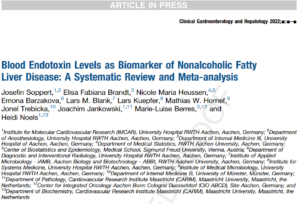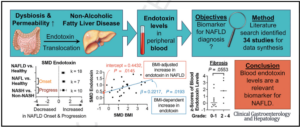New CRC publication:
Blood Endotoxin Levels as Biomarker of Nonalcoholic Fatty Liver Disease: A Systematic Review and Meta-analysis
This publication in Clinical Gastroenterology and Hepatology is the result of intensive collaboration of scientists in our CRC.
Scientists from 5 CRC projects participated in this study: Heidi Noels, Joachim Jankowski, Emona Barzakowa and Josefin Soppert (project A04), Marie-Luise Berres and Elisa Fabiana Brandt (project B04), Lars Blank and Lars Küpfer (project A06), Mathias W. Hornef (project A01) and Jonel Trebicka (project A09).
A growing body of evidence suggests the importance of gut-derived endotoxins in the pathology of non-alcoholic fatty liver disease (NAFLD), but the relation of blood endotoxin levels with increased gut permeability and disease stage remains unclear.
By synthesizing data from 34 observational studies, this study identified blood endotoxin levels as valuable biomarker for NAFLD in early as well as advanced stage. Moreover, endotoxin levels are positively correlated with markers of increased gut permeability observed in NAFLD patients.
Thus, blood endotoxin levels might be a valuable additional diagnostic tool to identify NALFD at early stages, which is a potentially reversible condition and can be positively influenced by lifestyle modification.


